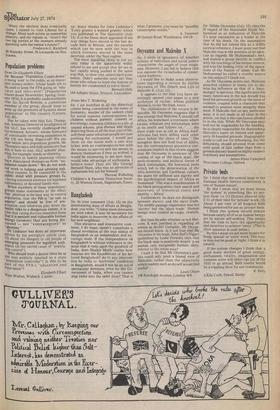Onyeama and Malcolm X
Sir: I write in ignorance of whether notions of radicalism and social justice characterise the pages of your magazine. However, I am led to believe that you espouse-the vicissitudes of conservative tradition.
I would like to make some observations regarding a review by Dillibe Onyeama of The Death and Life of Malcolm X, (July 13).
It appears to me that you have unwittingly opened your pages to a new archetype of racism, whose political demise is, to say the least, naive.
The childishness of the review is despicable. Mr Onyeama suggests that it was strange that Malcolm X should call Africa, his homeland, a continent where racism, tribalism and nationalism were at its zenith and follows on, ". . the ' slave trade was as old as Africa itself. Africans had been selling each other since before the dawn of time." The metaphor does not hold true of Africa, but the contemptuous pejorative connotations implicit in this review suggest that Mr Onyeama is unaware of 'the coming of age of the black man': the socio-economic and political forces of black nationalism, the historical roots which led to the deracination of the Afro-American and Caribbean culture, the quest for selfhood and dignity and the psychological impact of Africa as 'homeland.' This was a manifestation of the black protagonists; their search and discovery of historical roots and identity – Africa!
Furthermore, he does not distinguish between slavery and the slave trade. The middle passage experience was not 'slavery' but the 'slave trade.' Human beings were treated as cargo, chattels, etc.
But then he asks whether or not Malcolm X was justified in regarding all whites as devils? Certainly, Mr Onyeama should know. Is it not true that Mr Onyeama in his book, John Bull's Nigger (published by Leslie Frewin), says that the black man is positively stupid: is an animal, only marginally human; dirty, inferior to the white man?
Could it be that Mr Onyeama's politics could only posit a biased view of Malcolm, rather than the objectivity which readers such as myself would find useful?
Louis Chase 198 Randolph Avenue, London W9 Sir: Dillibe Onyeama (July 13) cites the ill regard of the Honorable Elijah Muhammad as an indication of Malcolm X's poor reputation as a leader at the time of his death. On the assumption that he did not intend this as a wildly satirical reference, 1 must point out that Malcolm was in the position of an apostate as regards Mr Muhammad's sect, had started a group directly in conflict with the teachings of his former mentor, and was the leading critic of the operations of the Nation of Islam. Can Mr Muhammad be called a worthy source on this subject? I think not.
As Mr Onyeama points out, Malcolm preached violence at times, yet to dismiss his influence as that of a 'hatemonger' is specious. His significance for many Americans in the last decade has been his personal growth on the issue of violence, coupled with a character that seemed to promise more integrity than most. If Malcolm lied on any particular issue, it is not made at all clear in the article, yet that is the conclusion alluded to in the title. While Mr Onyeama may well not be responsible for the heading, he is clearly responsible for diminishing Malcolm's name on limited and apparently ill-founded grounds. Hagiography tends to call out for debunking, but the debunking should proceed from some solid point of fact rather than from a general distaste based on highly suspect testimony and assumptions.
James Kimo Campbell Worcester College, Oxford.



























 Previous page
Previous page